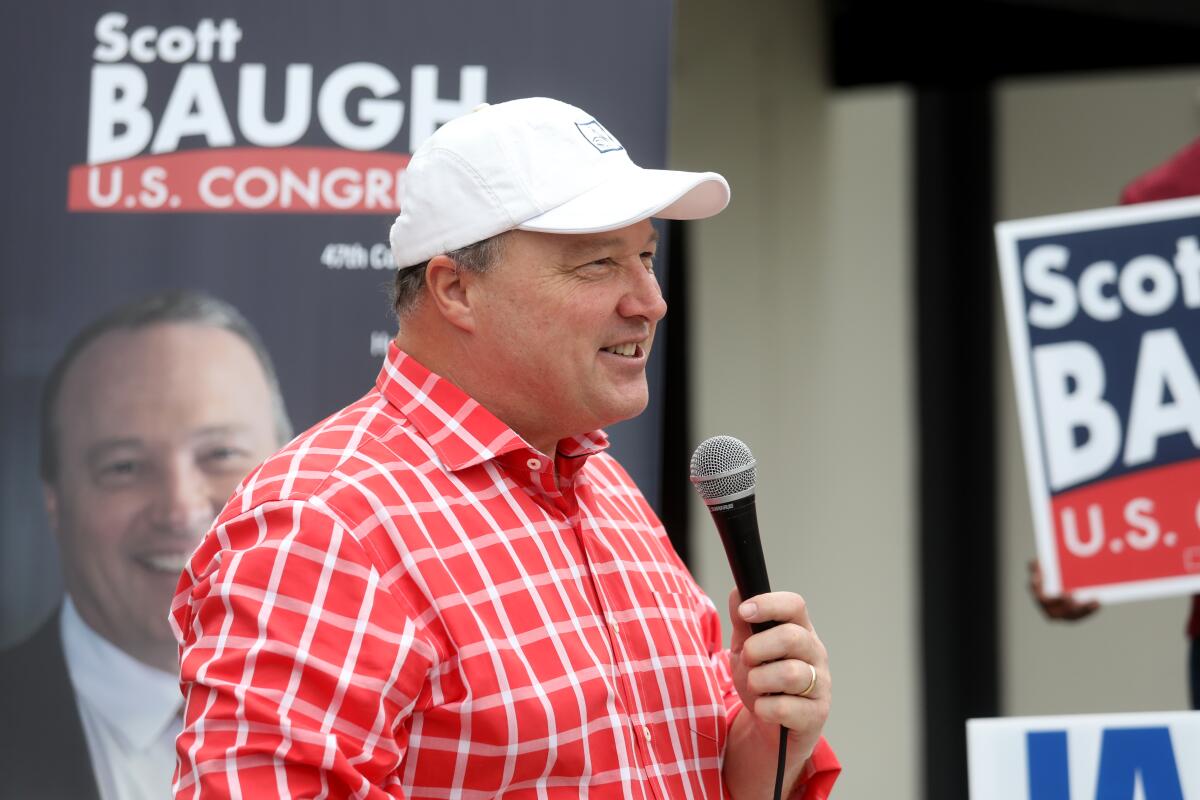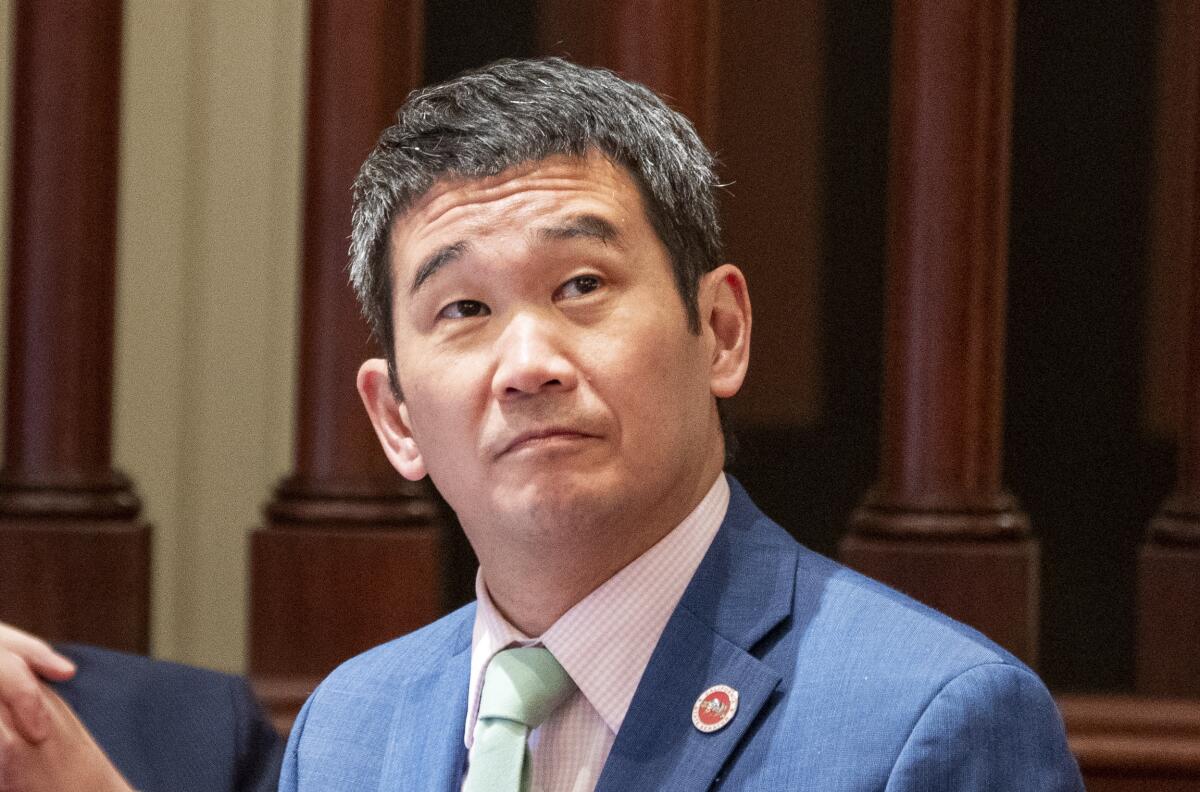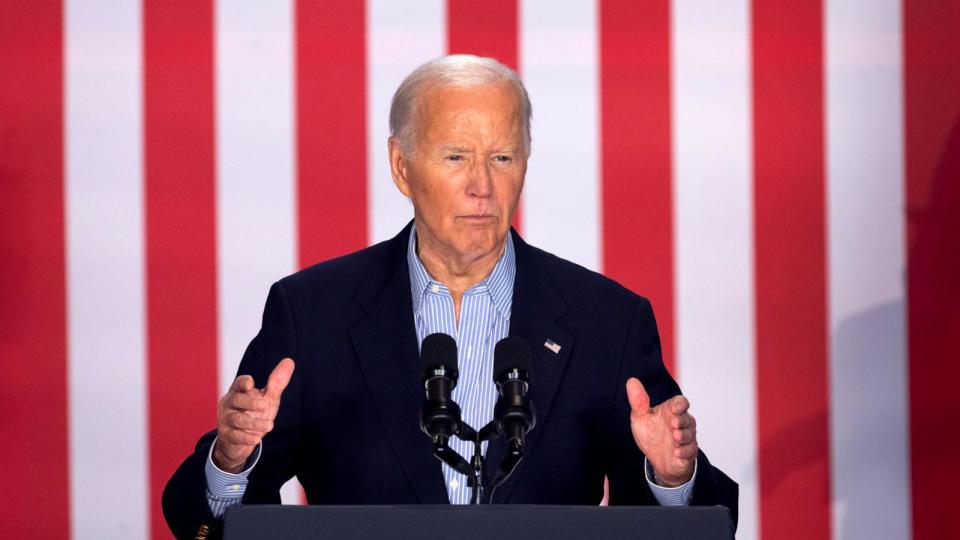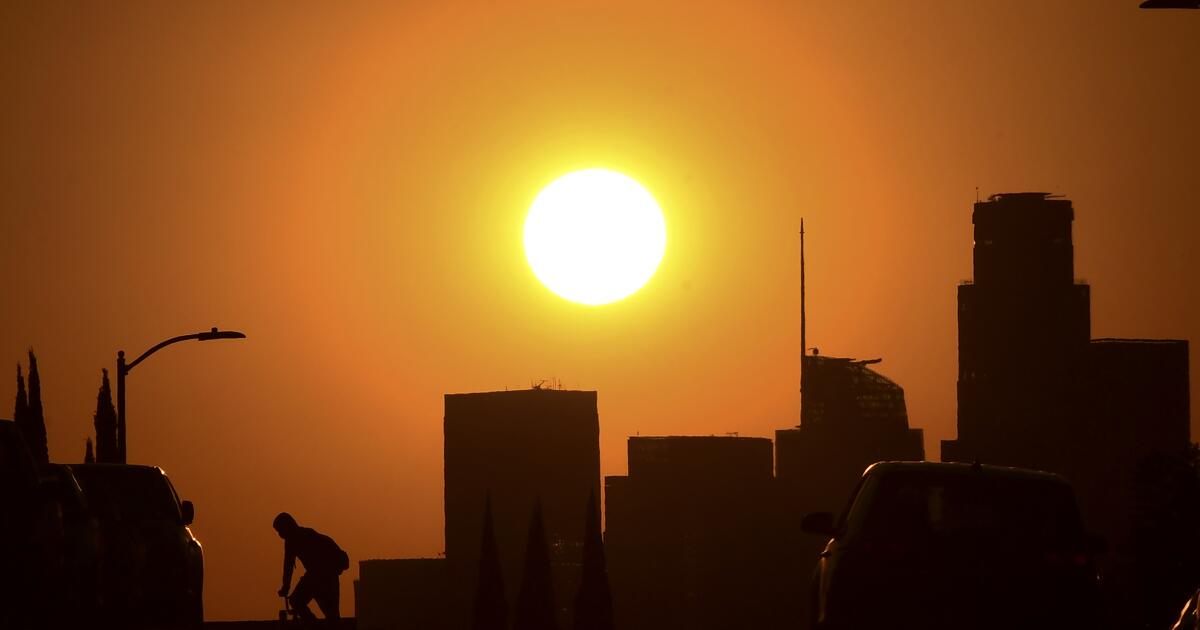World News
California races will be pivotal in determining House control

Barring divine intervention or the West Coast falling into the sea, President Biden will handily win California in the November election.
But should he — or presumptive GOP nominee Donald Trump — secure a second term in the fall, the future of either’s policy agenda rests heavily on which party controls Congress, where Republicans currently hold a wafer-thin majority in the U.S. House of Representatives.
With the Golden State home to some of the most hotly contested swing districts in the country, the House’s fate will almost certainly come down to California.
The battle for the next two years of partisan political control will be waged door-to-door, from California’s beachside suburban cul-de-sacs to the tiny farm towns in the state’s fertile Central Valley.
Those battlefields will look a lot like Bridgecreek Plaza — a sun-bleached shopping center a few hundred yards from a freeway onramp in Orange County’s Huntington Beach. The mall is home to a crystal store, several insurance brokers, a dentist and the local Republican Party headquarters.
It’s also where about two dozen GOP faithful gathered on the morning of election day, bowing their heads for a quick prayer and pledging allegiance to a portable flag before turning their attention to Jessica Millan Patterson, chair of the California Republican Party.
Patterson was in a very good mood.
When she was first elected to lead the party, in 2019, California Republicans were “essentially the third-largest party in the state,” having sunk below the share of voters registering “decline to state” under party preference.
But Patterson had presided over a massive voter registration drive over the last five years, and the party had moved back into second. People across the country liked to dismiss “blue California,” she said, but they were forgetting that California has more registered Republicans than any other state.
“California Republicans are the reasons why we have a House majority,” she added, to raucous cheering.
That majority was what they hoped to hold on to, and the group would spend the morning of the March 5 primary election canvassing for Scott Baugh, a Republican attorney and former state Assembly member vying to push Democratic Rep. Katie Porter’s soon-to-be-open congressional seat back from blue to red.

Scott Baugh is trying again to flip Orange County’s 47th District back to the red column. The seat is a chief target of state and national Republican efforts to maintain control of the House.
(Gary Coronado / Los Angeles Times)
The latest round of redistricting put more conservative enclaves such as Huntington Beach and Newport Beach into California’s 47th Congressional District, and Baugh lost to Porter only narrowly in 2022 despite being vastly outspent, making the coastal Orange County district one of the most competitive in the nation.
The charismatic Porter will be out of the House picture after a failed Senate run; her seat is one of the National Republican Congressional Committee’s three offensive targets in California and top priorities. And it’s equally prized by Democrats.
In a country where enmity and distrust separate the two major political parties on most issues, California’s utmost importance to any November House strategy is one of the few things on which Republicans and Democrats can agree.
California is home to 10 races rated as competitive by the nonpartisan Cook Political Report — five of them in districts that are represented by Republicans but that President Biden won in 2020. In the months to come, both parties will be investing significant resources in those races, as national attention inevitably turns west.
With an expected Biden-Trump rematch, voter turnout in 2024 is also likely to be supercharged compared with the 2022 midterm election. That could give an edge to Democrats, given the registration advantage that they hold in many of the competitive districts. Republicans gained one California House seat in the 2022 midterms, a nonpresidential election when turnout was substantially lower than when Biden and Trump topped the ballot two years prior.
“At the end of the day, the path to 218 runs through California,” said Democratic Congressional Campaign Committee spokesperson Dan Gottlieb, referring to the number of seats needed to garner a House majority.

Dave Min will face Baugh in November’s runoff for the 47th District seat, which Katie Porter is vacating. Min’s bruising primary battle for the crucial seat has already cost Democrats millions.
(Rich Pedroncelli / Associated Press)
Gottlieb was bullish on his party’s chances, citing the high turnout expected for the presidential election, along with strong Democratic candidates and “a bunch of dysfunctional and out-of-touch Republicans enabling the worst of their party’s chaos and dysfunction and extremism.”
But Gottlieb’s GOP counterpart was equally roseate in his outlook, with National Republican Congressional Committee spokesperson Ben Petersen reveling in the ugly and expensive primary fights that consumed Democrats in several of the state’s most crucial swing districts.
In the O.C. district where GOP volunteers fanned out for Baugh on primary morning, Democrats had sunk millions into a bruising primary battle between state Sen. Dave Min and fellow Democrat Joanna Weiss. Min ultimately emerged victorious, but only after surviving a barrage of negative advertising centered on his 2023 arrest for driving while intoxicated — arguably a gift to Republicans ahead of his fall battle with Baugh.
“Extreme Democrats are stumbling out of their vicious primary fights broke and bested by Republicans, who saw a groundswell of support for a commonsense safety and affordability agenda,” Petersen said, adding that the primary results made clear the GOP was “playing offense in California” in a way that would set the stage for victories in November.
Baugh, though, is not expected to go unscathed. In 2022, Porter’s ad campaign ripped the Republican for his antiabortion stance, as well as his work as a lobbyist and criminal charges he faced over campaign violations, for which he ultimately paid $47,000 in fines.
In the San Joaquin Valley, there were last-minute fears that a bruising primary battle would lock Democrats out of one of the races where they have the best chance of flipping a seat, but those concerns proved overblown.
Rudy Salas, backed by the Democratic establishment, vanquished fellow Democrat Melissa Hurtado to secure a spot in the fall against incumbent Rep. David Valadao (R-Hanford) in the 22nd Congressional District, but that race also put a dent in Democratic coffers.
The November race will be a rematch of the pair’s 2022 runoff, when Salas lost to Valadao by several thousand votes. And Salas and Valadao won’t be the only rematch on the November ticket.
In a heavily agricultural San Joaquin Valley district that includes all of Merced County and parts of Fresno, Madera, San Joaquin and Stanislaus counties, incumbent GOP Rep. John Duarte will once again face off against Democratic challenger Adam Gray. Duarte won the 13th Congressional District in the midterm election by fewer than 600 votes, one of the closest races in the nation.
Several hundred miles southeast, in Southern California, Democratic challenger Will Rollins will again take on GOP incumbent Rep. Ken Calvert, the longest-serving member of the California delegation. The recently redrawn 41st Congressional District stretches from the suburban Inland Empire, where Calvert has long lived, to Palm Springs, where Rollins and his partner make their home.
The district’s new boundaries — which now include one of the largest concentrations of LGBTQ+ voters in the nation and liberal pockets of Californians in the desert — are far more friendly to Democrats. They also set up Rollins, who is gay, as a potent challenger to Calvert, who voted against LGBTQ+ rights in the past, but who says his views have since evolved.
One race that will have some new blood this year, after the same pair of candidates dueled in three previous elections, is California’s 27th Congressional District in northern Los Angeles County.
Once solidly Republican, the district has been reconfigured by redistricting, and has undergone a political transition driven by younger, more diverse transplants from L.A. seeking affordable housing in Santa Clarita and the Antelope Valley. The district briefly switched from red to blue with former Rep. Katie Hill’s victory in 2018, but the young Democrat’s very public scandals and ultimate resignation helped hand the seat back to the GOP.
Now-incumbent GOP Rep. Mike Garcia beat Democrat Christy Smith in a 2019 special election to fill the seat, then twice more for full terms in 2020 and 2022. He will face off against George Whitesides, a fresh Democratic challenger, in November.
Ludovic Blain, executive director of the California Donor Table, a progressive group that pools donor funds, said his organization hopes to invest about $10 million in California House races in the fall, working with local nonprofits in key areas to turn out voters of color.
They’ll be focusing on seven key races: the three aforementioned rematches, Porter’s open seat and two other Orange County races, and the Garcia-Whitesides matchup.
One point of concern Blain raised is that Republican Steve Garvey’s place near the top of the ticket, facing off against Rep. Adam B. Schiff (D-Burbank) in the Senate race, might affect Democrats in House races.
Schiff engaged in a controversial strategy in the primary, boosting Garvey to lock out Porter and his other major Democratic challenger, Rep. Barbara Lee (D-Oakland), whom Blain’s organization supported.
It was a gambit that some in the Democratic establishment said would actually help Democrats in other tight races, since a less-competitive Senate race would siphon away far less money from the party’s coffers.
But others, like Blain, argue that Garvey’s presence could hurt down-ballot Democrats. Plus, having him on the ballot may draw in moderate Republican and independent voters who remain sour on Trump.
“Having Garvey, I think, does spike or further encourage Republican voters to turn out, and more importantly, to vote down the ticket,” Blain said.
Patterson agreed. Unlike Trump, Garvey will likely campaign across the state, providing a lift for other Republicans while he’s at it.
World News
2nd local radio host says they were given questions ahead of Biden interview

A second local radio host on Saturday told ABC News that he was provided a list of questions in advance of his interview with President Joe Biden this week.
“Yes, I was given some questions for Biden,” Earl Ingram of CivicMedia told ABC News. Ingram, a prominent host of a Wisconsin radio station, interviewed Biden this week in the wake of his debate performance.
Ingram said he was given five questions and ended up asking four of them.
“I didn’t get a chance to ask him all the things I wanted to ask,” he said.
Ingram is the second interviewer who now says they were provided questions by Biden aides to ask the president this week. Earlier today, another local radio host who interviewed Biden this week told CNN she was given questions to ask Biden before the interview.


“We do not condition interviews on acceptance of these questions, and hosts are always free to ask the questions they think will best inform their listeners,” the Biden campaign told ABC News on Saturday.
Ingram told ABC he didn’t see anything necessarily wrong with the practice. “To think that I was gonna get an opportunity to ask any question to the President of the United States, I think, is a bit more than anybody should expect,” he said.
He continued that he was grateful for the opportunity to interview Biden at all.
“Certainly the fact that they gave me this opportunity … meant a lot to me,” Ingram said.
MORE: Wealthy Democratic donors sound alarm over Biden staying in race
On CNN earlier today, Andrea Lawful-Sanders, the host of WURD’s “The Source,” said Biden officials provided her with a list of eight questions ahead of their interview with Biden.
“The questions were sent to me for approval; I approved of them,” she said.
“I got several questions — eight of them,” she continued. “And the four that were chosen were the ones that I approved.”
Responding to Lawful-Sanders, Biden campaign spokesperson Lauren Hitt said in a statement that it’s not “uncommon” for interviewees to share topics they would prefer. She noted that Lawful-Sanders was “free” to ask any questions she saw fit. She also noted that it was the campaign who sent over the questions and not the White House as other reports claim.
Lawful-Sanders did note in her interview with CNN that she ultimately “approved” the questions provided.
“It’s not at all an uncommon practice for interviewees to share topics they would prefer. These questions were relevant to news of the day – the president was asked about this debate performance as well as what he’d delivered for black Americans,” the statement said.
“We do not condition interviews on acceptance of these questions, and hosts are always free to ask the questions they think will best inform their listeners. In addition to these interviews, the President also participated in a press gaggle yesterday as well as an interview with ABC. Americans have had several opportunities to see him unscripted since the debate.”
A source familiar with the Biden booking operation told ABC News that moving forward they will “refrain” from offering suggested questions to interviewers.
“While interview hosts have always been free to ask whatever questions they please, moving forward we will refrain from offering suggested questions.”
2nd local radio host says they were given questions ahead of Biden interview originally appeared on abcnews.go.com
World News
President George W. Bush turns 78 years old


George W. Bush, born on July 6, 1946, in New Haven, Connecticut, was the 43rd President of the United States.
Bush was born to parents Barbara Bush and former President George H. W. Bush. He has five siblings; Jeb Bush, Marvin Bush, Neil Bush, Dorothy Bush Koch and Pauline Robinson Bush. Pauline was diagnosed with leukemia and passed away at age three.
He was formerly the Republican Governor of Texas from 1995 to 2000.
WHY FORMER PRESIDENT GEORGE W. BUSH IS WINNING … THE POST-PRESIDENCY
Bush was first elected to the White House in November 2000, and officially began his first term as president in January 2001, after he defeated Democrat Al Gore during the presidential election. Bush was reelected to his second term as the incumbent in November 2004, when he prevailed over Democrat John Kerry, and led the United States until January 2009 before handing over his torch to former President Barack Obama.
Bush married Laura Bush on November 5, 1977, the day after her 31st birthday, in her hometown of Midland, Texas. The couple were engaged in September 1977, and married less than two months later in a Methodist church. Bush and Laura met at a barbecue, and he took her to play mini-golf on their first date.
The Bush’s share twin daughters, Barbara Pierce Bush and Jenna Bush Hager, born on November 25, 1981. Today, the couple also share four grandchildren; Mila, Poppy, Hal and Cora.
GEORGE BUSH, FORMER FIRST LADY ISSUE STATEMENT ON AFGHANISTAN WITH MESSAGE TO US TROOPS, VETERANS
During his presidency, Bush cared for his English springer spaniel, Spot Fetcher, who accompanied him to meetings in the Oval Office and on adventures throughout the White House. The dog was born to his parent’s dog, Millie.
On September 11, 2001, less than one year into Bush’s presidency, the Twin Towers in New York City were attacked by terrorists when airplanes hit both buildings, causing a collapse and thousands of lives lost. At the time, Bush was reading to elementary-aged children at a school in Sarasota, Florida. He was calmly and quietly advised of the attacks and quickly returned to Washington, where he was briefed alongside Vice President Dick Cheney.
Bush was regarded highly for his poise while learning of the attacks and for his demonstration of patriotism and leadership in the uncertain days and weeks following the hijackings of multiple planes on the day that shook America to her core.
SADDAM CAPTURED ‘LIKE A RAT’ IN RAID
On December 30, 2003, during Bush’s first term as POTUS, Saddam Hussein, the Iraqi leader and executor of the 9/11 attacks on the U.S., was captured by the American military.
In the early morning of December 30, 2006, during Bush’s presidency, Hussein was hanged and executed for his crimes against humanity. Americans across the nation celebrated the death of Hussein and applauded Bush for promising the country he would take him out and following through.
While Bush was regarded for his dealings with the terrorist attacks, the signing of No Child Left Behind Act and the Patriot Act and the creation of the United States Department of Homeland Security, many Americans were unhappy with the sanctions of interrogation techniques, the war in Iraq and taxes while he was president.
CLICK HERE TO GET THE FOX NEWS APP
World News
These Obscure Democrats Could Soon Become Kingmakers

They are lawyers and school board members, labor activists and faith leaders, lifelong Democrats and party newcomers. Some of them just turned 18, others are pushing 80.
These are the people who make up the 3,939 delegates to the Democratic National Convention. Some are elected, and some are selected — each state party has its own rules — for what is normally a ceremonial task: nominating their candidate for president.
But in the — still unlikely — scenario in which President Biden steps down as the nominee, they will suddenly be charged with picking a new nominee.
Most of these delegates did not set out to become kingmakers in the Democratic Party, but rather to be part of a pro-Biden slate pledging support to the president. But in the event Mr. Biden drops out, they would be vaulted from the obscurity of extras at a quadrennial television extravaganza into a group with the fate of the party — and, in the view of many Democrats, the future of the country — on their shoulders.
Many are loath to even consider that as an option, remaining steadfastly loyal to the president as he affirms his commitment to remaining in the race. And some find themselves overwhelmed by the possibility.
Phil Swanhorst, the chair of the Eau Claire County Democrats in Wisconsin and a first-time delegate, said that “with all the turmoil going on,” he did not want to discuss what he would do as a free delegate if released from his pledged status. Instead, he said he would follow the guidance of Ben Wikler, the chair of the state party.
Ronald Martin, a social studies teacher and member of the National Education Association, a teachers’ union, said he was wholeheartedly behind the president, dismissing Mr. Biden’s debate performance as simply a “bad night” — echoing the president’s words — and not representative of anything else. But forced to make a decision in the event that Mr. Biden withdraws, Mr. Martin said he would take a step back and assess the entire field rather than immediately vote for an alternative.
“I would respect President Biden’s decision, whatever he says, but again, I’d sit and listen to everything,” Mr. Martin said, adding that defeating former President Donald J. Trump remained the goal.
In a speech in Wisconsin on Friday, and in an ABC News interview that aired later in the day, Mr. Biden made it clear he had no intention of withdrawing. “I’m staying in this race,” Mr. Biden told the Wisconsin crowd, to cheers. “I’m not letting one 90-minute debate wipe out three and a half years of work.”
Almost all of the delegates — roughly 99 percent — are pledged to Mr. Biden, reflecting the popular vote in their state primaries. They are not free to support another candidate of their choosing, unless Mr. Biden withdraws. While there is a so-called conscience clause in the rules, permitting delegates to break with their delegations, it is rarely, if ever, exercised.
“This is not 2016, and it’s not 2008, when you had a split delegation,” said Donna Brazile, a former chair of the Democratic National Committee. “This is a Biden convention.”
There are also roughly 700 “automatic delegates” — formerly and commonly known as superdelegates — who are chosen because of their roles in the party. Governors, senators, members of Congress, state party chairs and other high-ranking members within the party make up this contingent, though they do not vote in the first round of nominations.
The final list of the delegates has not been released by the Democratic National Party, but a review of delegate lists released by state parties shows a diverse slate, as required by party rules.
Take the Wisconsin delegation: Among the 95 delegates, there are more than 20 local government officials, 11 current and former educators, nine labor leaders, six college students and a former executive of the Milwaukee Bucks.
Trevor Jung, one of those local government officials — he is the transit director for Racine, Wis. — said he had been involved in politics since he was 12, when his single father used to drop him off at the local Democratic headquarters. Having been a first-time delegate in 2020, Mr. Jung cannot fathom a ticket without Mr. Biden at the top and is unsure what he would do in the event of an open convention.
“I have not given it much thought, and it’s in part because I think President Biden will be our nominee,” he said. “President Biden had a bad night, and Donald Trump had a bad presidency.”
Amaad Rivera-Wagner, the chief of staff to the mayor of Green Bay, Wis., and a second-time Biden delegate, recalled receiving death threats in 2020 because people believed he had rigged the election.
“Yes, there is turmoil, but the convention feels clear to me,” Mr. Rivera-Wagner said, adding that Mr. Biden would have the best chance against Mr. Trump. While he does not believe Mr. Biden will step down, he said he would “explore my conscience but follow Democrats’ suggestion” in that unlikely event.
Most state delegations have many representatives who have served at past conventions. Judy Mount, who said she was the “first African American in the state of Florida — since Ponce de Leon got here — to be first vice chair” of the state Democratic Party, has served at every convention since Barack Obama’s first convention in 2008.
She said she remained a steadfast supporter of Mr. Biden and would follow his guidance if he were to drop out.
“Only if he makes that announcement,” Ms. Mount, 64, said. “Because I have the utmost respect for that young man.”
L. Jeannette Mobley, a delegate from Washington, D.C., who said she had also been a delegate for Mr. Obama in 2008, was similarly loyal to Mr. Biden, saying he had done more “in his first three years than most presidents” and brushing off his debate performance.
Were Mr. Biden to drop out, she said, she would also follow his recommendation.
“If he makes the decision to withdraw, I’m sure he’s going to probably come out with a recommendation,” Ms. Mobley said, adding of Vice President Kamala Harris: “Probably Kamala would be the best person to run. She’s very capable. Don’t get me wrong about that. Although I really have some concerns about whether or not America is ready for a woman president.”
Ms. Mobley mused that if Ms. Harris were to pick “one of the other individuals, like Newsom or Shapiro, then we still have a winning ticket,” referring to Gavin Newson, the governor of California, and Josh Shapiro, the governor of Pennsylvania.
Dave Jacobson, a delegate from Florida who is one year younger than Mr. Biden, called last Thursday’s debate “devastating” but was heartened by the president’s more energetic rally the next day and remains steadfastly in support. Like Ms. Mobley, if forced to vote for someone else by Mr. Biden’s withdrawal, Mr. Jacobson said that “the vice president would be the logical choice.”
“It would be a travesty if something were to happen that Joe bowed out and that Kamala would not be our nominee,” Mr. Jacobson said. “If she is not, the Democratic Party will face a pretty devastating election on Nov. 5.”
June Kim, Eli Murray, Andrew Park, Helmuth Rosales, Elena Shao and Amy Schoenfeld Walker contributed reporting. Alain Delaquérière contributed research.
-

 African History5 years ago
African History5 years agoA Closer Look: Afro-Mexicans 🇲🇽
-

 African History5 months ago
African History5 months agoBlack History Facts I had to Learn on My Own pt.6 📜
-

 African History5 years ago
African History5 years agoA Closer Look: Afro-Mexicans 🇲🇽
-

 African History1 year ago
African History1 year agoMajor African Tribes taken away during the Atlantic Slave Trade🌍 #slavetrade #africanamericanhistory
-

 African History1 year ago
African History1 year agoCameroon 🇨🇲 World Cup History (1962-2022) #football #realmadrid #shorts
-

 African History5 months ago
African History5 months agoBlack History Inventors: Mary Kenner 🩸
-

 African History1 year ago
African History1 year agoPROOF AFRICAN AMERICANS AIN'T FROM AFRICA DOCUMENTED EVIDENCE
-

 African History1 year ago
African History1 year agoNo African pre-Columbus DNA? 🤯🤯 #history #mesoamerica #mexico #african






























